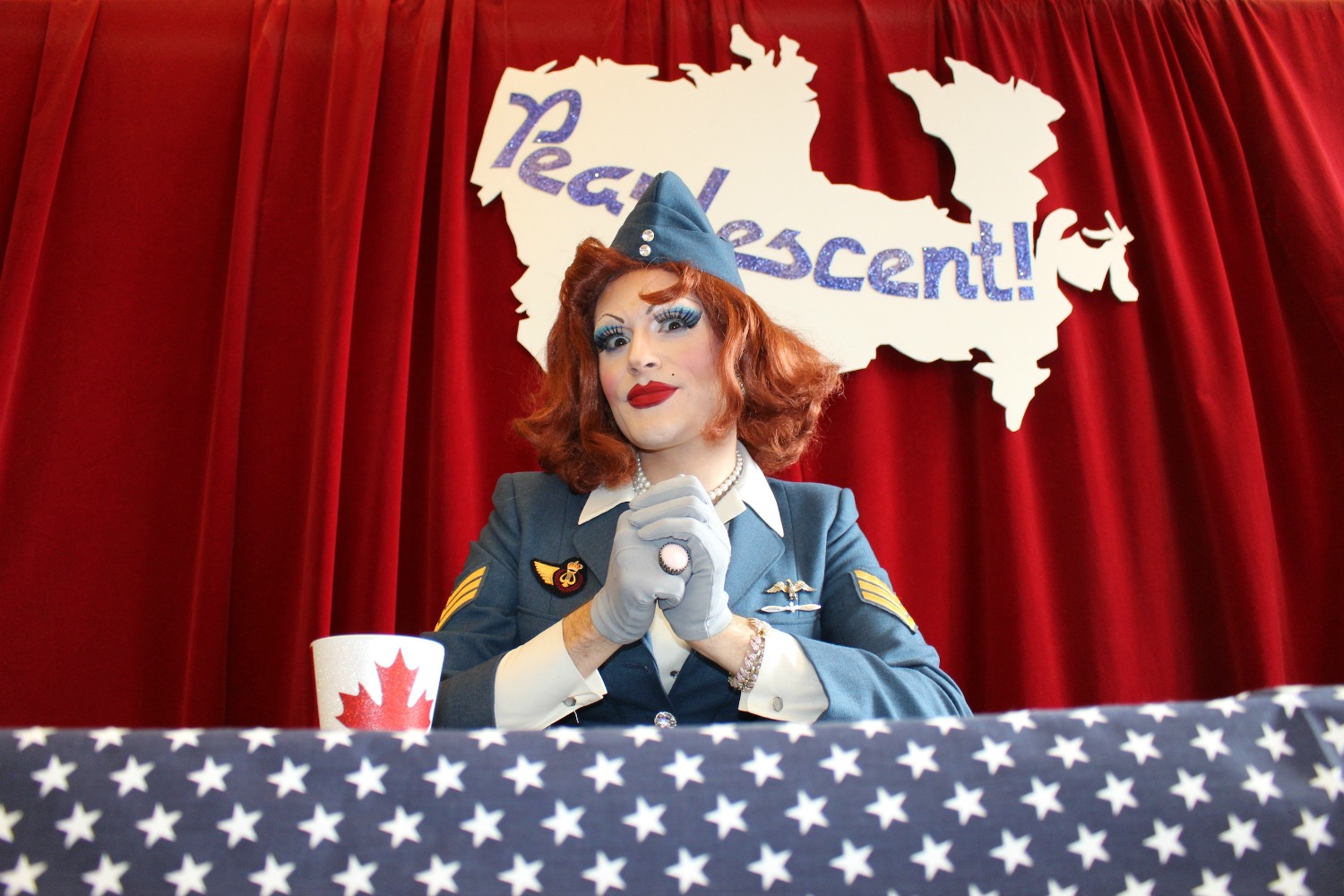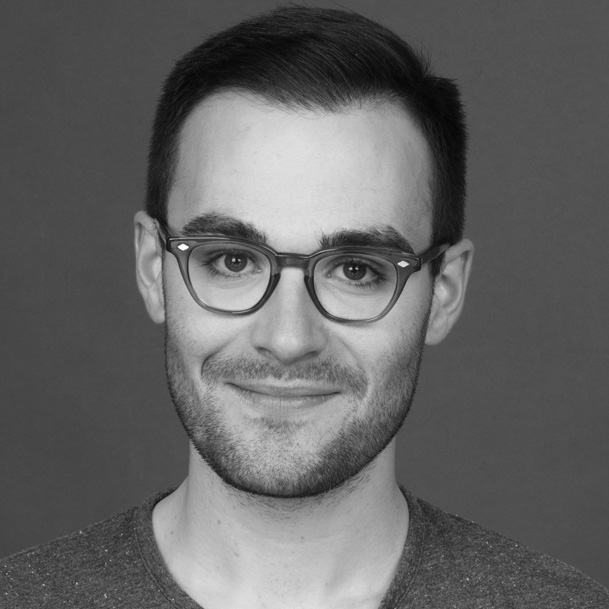A Drag Queen’s Divine Worship
I was six years old when I started wearing women’s costume jewelry. This boyhood phase lasted for two years. Later, at my Catholic elementary school, I learned that this was called “foreshadowing.”
I grew up and became an actor, and a writer, and (increasingly) a drag queen.
Wearing drag is not a glamorous experience; it is, in fact, awful. It’s sticky, finicky, hot, and uncomfortable. Makeup alone is nearly a two-hour process, involving over a dozen different products and even more brushes. And because I have a prodigious pair of eyebrows, I paste them down with alternating layers of glue stick and Pros-Aide, a medical-grade adhesive. I wear sculpted upholstery foam against my body to simulate hourglass hips, with five pairs of pantyhose overtop. I have a low tolerance for high heels.
There’s no glamour in drag until you’re standing in front of someone else. When you have an audience. That’s when you feel changed. Because their eyes have changed you. They have given you glamour, beauty, power, authority, and permission. Permission to say anything, if you’re charming enough. To do anything, if you’re bold enough.
And if you’re smart enough, they’ll give themselves over to you. They’ll trust you to lead them. They’ll follow you through the valley of darkness. They’ll believe you know the way.
(I never said I did. But I’m always good company.)
The relationship between a drag queen and her audience is as codependent as the one between the Lord and His believers. We are both useless without them.
* * *
Since August 2014, I’ve been performing as my alter ego, Pearle Harbour—an all-American world-wartime gal and superstar stewardess of the Air Force. Originally conceived as the theatrical inversion of the “dumb American trope”—a favourite of Canadian comedy—Pearle was born into Rob Ford’s Toronto, in Stephen Harper’s Canada. It was a different time. We couldn’t even say, “I am Canadian” without cringing; Molson was bought by Coors, remember?
It’s been a long-running joke (and anxiety) that Canada was just America Jr, and so Pearle Harbour had arrived to make that subtext explicit. She was Manifest Destiny, manifested. She wanted you to know that together, we’ll be U.S. of A–okay.
But I didn’t put Pearle Harbour down when our country rediscovered itself in the embrace of nouveau Trudeaumania. Over two years and five dark tragicomedies, this vintage queen has become all the more contemporary and urgent in the age of identity politics. Pearle Harbour comes from an era of rigorous belonging, through her nationhood, womanhood, and church. But trapped in Trudeau’s “post-national” nation, on a fluctuating gender continuum, with millennials… she is hopelessly out of place, and out of time. I write about her isolation, her loneliness, her desperate desire for communion.
These days, I think about this word communion more and more (Catholic school wasn’t for nothing). Communion is an exchange between people on a spiritual level. I’m not talking theologically, but a sort of hypersensitivity to all the minute vibrations and murmurs and breaths and needs of those around you. I believe communion is physical experience: when your heartbeat thumps in sync with the many heartbeats around you, and the gaps between your bodies suddenly vanish… that’s the transcendent feeling of community.
Not a community defined by ideology, but by a collective laughter, dread, fear, and hope. Salvation is still possible. I have felt it.
Yas, gawd.
* * *
In my newest play, Pearle Harbour’s Sunday School, I’m preaching from the good book: Facebook. Where each community has a page that you can like: from Trump to the Dakota pipeline protest and everything in between. Where you can be intersectional with everybody, if you want to. Where connection and belonging comes easy.
Finally!
A community is one of those things I’ve always wanted, something I thought I should have. But is it at all surprising to hear that the boy who wore ladies’ jewelry socially—in the 90s!—has a hard time fitting in?
I come from a broken family. The church and I parted ways a good few years before my sexual awakening, which would have exploded that relationship anyway.

But on Church Street, I’ve never felt comfortable—too plain, too odd, too self-conscious and arrhythmic on the dance floor.
While I’ve always been well-liked, close friends don’t come easy. I am, at heart, a lonely guy. But really, who isn’t lonely these days? Who truly believes that social networks have brought us closer?
This isn’t sad, it’s become my bread-and-butter. I’ve made a show of my otherness. Like me, Pearle Harbour has an uneasy relationship with community. She struggles with opposing desires: to be embraced by the collective and to transcend the collective. Because what’s more comforting: knowing that you’re utterly unique (and, consequently, alone), or that there are lots and lots of people just like you? What’s more terrifying?
* * *
Drag is best when it’s gaudy and fun and honest and vulnerable. Drag can be meaningful beyond entertainment. Each night I perform, I attempt to find communion with my audience. And here’s the neat thing: as audience, you get to affect the outcome. For real. I’m not sure whether this play is a tragedy or comedy. I’m waiting for your input.
I’m waiting to see how far we can push it.
You might love Pearle Harbour. Or you may hate her, or pity her. You can be her best friend and ally, or her greatest foe. You can shake your head at her hypocrisies, or you can admit maybe that one time you thought the same, even if you didn’t want to. You can even feel all these things at once. Or none of them. I’ll still listen for your gasps, your derision, your little laughs when you think “maybe I shouldn’t be laughing.” I’ll listen to how your heart beats, and delight when I hear it skip.
We both get a show. But what is happening in the audience is probably infinitely grander than anything that is happening onstage. Our community is formed in a brief and deeply passionate exchange, and, after an hour, is disbanded. And you will be sent back out into the world. Hopefully, you will feel yourself challenged, and changed. And a part of something bigger than just your own special self.
The power of Pearle compels you.
Pearle Harbour’s Battle Cry is on at 10 p.m. on February 15 as part of the Rhubarb Festival. For tickets or more information, click here.










Comments